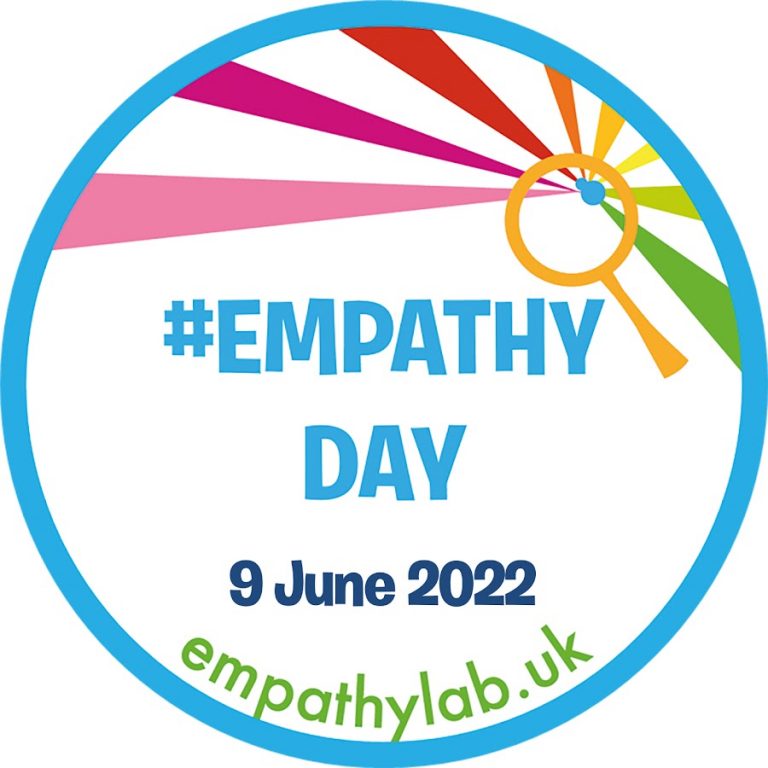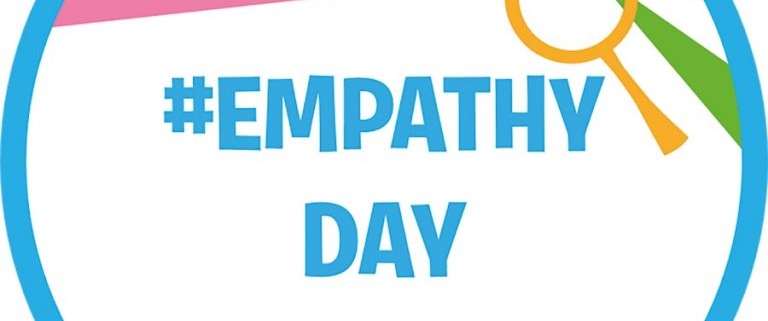Q&A with Miranda McKearney
Empathy Lab goes from strength to strength in highlighting the importance of empathy in our young readers. Empathy can be learned and books can be a vital tool in learning and developing empathy. We are thrilled to present a Q&A with Miranda, founder of Empathy Lab. With great thanks to Fritha Lindqvist for the brilliant questions.

Your work is all about building empathy in the younger generation – do you feel there is an empathy deficit in our society right now?
We’re hearing very worrying reports from schools about the effect of lockdowns on children’s social skills – so yes, an empathy deficit in terms of the younger generation being isolated and deprived of the chance to build these crucial skills. And of course, our world sadly suffers from hatred and prejudice – we see empathy education as a vital antidote.
In 2022, we want to do all we possibly can at EmpathyLab to surround children with the understanding and feeling of connection that empathy brings, and equip them with the empathy skills they so very much need if they are to learn, to thrive and to contribute to building a kinder and less divided society.
Why are books such an important tool for building empathy in children?
Scientific research shows that because of the way stories activate so many areas of the brain, reading feels incredibly real, so when we identify with the feelings of book characters we build our real life understanding of other people. Stories are a simulation of the social world, and give children a safe, nourishing space to learn about other people’s lives, feelings and perspectives.
You’ve just announced the fifth Read for Empathy collection. What was the goal in starting these annual book collections and how does the selection process work?
We started the annual Read for Empathy collections in response to requests from teachers and library staff, who were asking for recommendations. We aim to ensure children everywhere can access empathy-rich, contemporary, diverse books – through schools, libraries, bookshops and in homes.
We started just with a primary collection, but in 2019 introduced a secondary collection in response to teachers and librarians who stressed how useful this would be for 12-16 year olds.
We invite publishers to submit titles using a very specific set of empathy criteria, and the books are read and hotly debated from April to November by an expert judging panel. This year there are 13 terrific judges, a mixture of teachers and librarians working in communities, and representatives from national organisations like the Open University and the School Library Association.
| JUDGING CRITERIA General/overall: high quality writing/illustrations with expertly crafted characters which readers care about. Book helps explore characters’ feelings and motivations Challenges tribal thinking: book explores themes about building understanding between individuals and communities Supports development of key empathy skills: perspective taking (e.g. through different characters’ points of view); emotion recognition/vocabulary; active listening; ability to put empathy into action Tackles key empathy issues of the day: e.g. refugees, homelessness, loneliness Provides insight into other challenging life circumstanceS: e.g. bereavement; mental illness; disability |
How many books are in the collection and what ages are they aimed at?
The 2022 collection features 60 books – 35 for primary aged children 4-11, and 25 for 12-16 year olds
This year we are also piloting a collection of books in Welsh and English. This is in response to requests from teachers in Wales, where much of our schools work is focused – excitingly, the new curriculum features empathy 35 times.
Are there any common themes among the books in the 2022 collection?
We’re excited by a really strong showing for books by a diverse range of writers and illustrators. 43% are from writers and illustrators of colour, and there’s such an ebullient range of genres, formats, ideas. In an increasingly diverse UK, these help children connect across divides.
The collection has a rich vein of books which help young people gain crucial insights into what it might feel like to experience challenging life circumstances , from physical disability to stammering; hearing loss to anorexia. And this year there are more historical books in the collection than before – empathy plays a key role in our ability to understand the past, and to use historical perspectives to try and avoid re-enacting past prejudice and hatred. This year’s collection has a strong showing for books about people in the past, from David Olusoga’s Black and British to Bali Rai’s Mohinder’s War, set in the Second World War.
There are many books in the collection chosen for their outstanding characterisation, helping young people understand how other people think and feel, people who are not themselves – Phil Earle’s character Joseph in When the Sky Falls is a great example.
Several of the books also feature strong characters who are exploring a range of identities– in The Proudest Blue, a Muslim girl proudly wearing her hijab to school; in Elle McNichol’s Show Us Who You Are, Cora fights in a futuristic world for the validity of her autistic identity.
How do you hope the books will help children?
The Read for Empathy collections will be used by parents, teachers and librarians in the run-up to Empathy Day and beyond to support children and instil empathy values and skills.
To take just one aspect – many books are chosen specifically to support the building of our four target empathy skills. Take perspective taking – such a key skill, being able to imagine someone else’s experience and point of view. In Manjeet Mann’s The Crossing, we explore the refugee experience through two very different characters. Luna, in Luna Loves Art, beautifully embodies the art of empathic communication as she helps Finn, who is a bit overwhelmed on an art gallery visit. Then there’s the skill of having the emotional vocabulary to name and share your feelings – the beautiful picture book a Shelter for Sadness is amazing for exploring, naming and healing a feeling of sadness. And finally the skill of putting empathy into action – Onjali Rauf’s Great Food Bank Heist has wonderfully activist children tackling problems of food poverty.
Can you give us a sneak peek at what’s in store for this year’s Empathy Day on 9th June 2022?
This annual event focuses on using books – and talking about them – to build understanding of the importance and practice of empathy. This year’s theme is Empathy, Our Human Superpower. at the end of March we’re making a powerful bank of free toolkits available, for primary and secondary teachers, library staff, early years professionals. We’re also offering pre-Empathy Day online training for schools and libraries, two half days across March 10 & 11. ;
Everyone is invited to join in the Empathy Superpower Challenge, choosing from a menu of nine empathy-boosting challenge activities grouped under Read, Connect and Act calls to action. Just a little more detail on some of those activities.
READ: we’re creating a massive crowdsourced book recommendation campaign, asking everyone to hold up their recommended read for empathy in a powerpose
CONNECT: the three activities in the Connect section include Empathy Walks, where you walk in your community noticing and reflecting with empathy; and a bank of listening switches to practice this key empathy skill.
ACT: this section has an activity called Empathy Superheroes, celebratory nominations for really empathetic people in the community. Another activity is Empathy Resolutions – asking us all to make a resolution which firms up our intentions to put empathy into action.
More information at empathylab.uk @EmpathyLabUK
https://www.empathylab.uk/2022-book-collections-and-guides
The full collection of books can be found on the link above.





Leave a Reply
Want to join the discussion?Feel free to contribute!